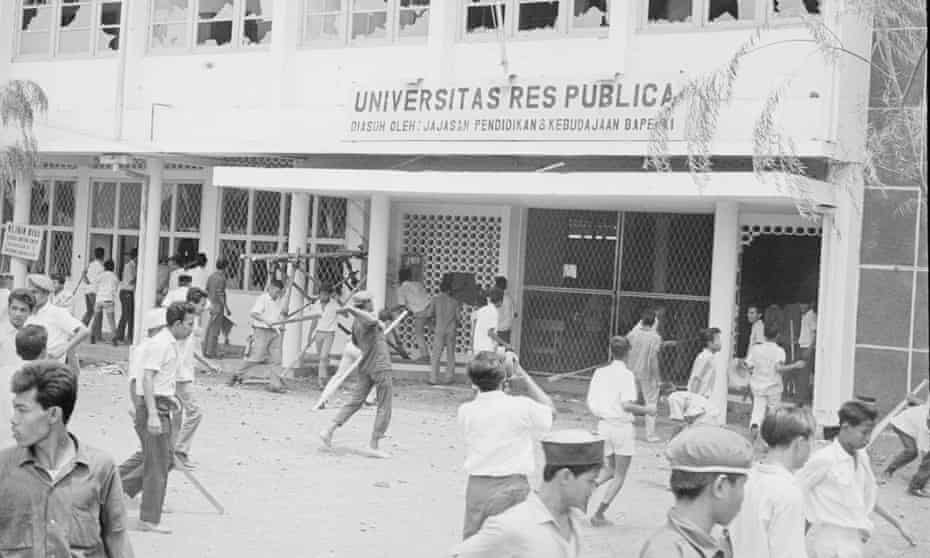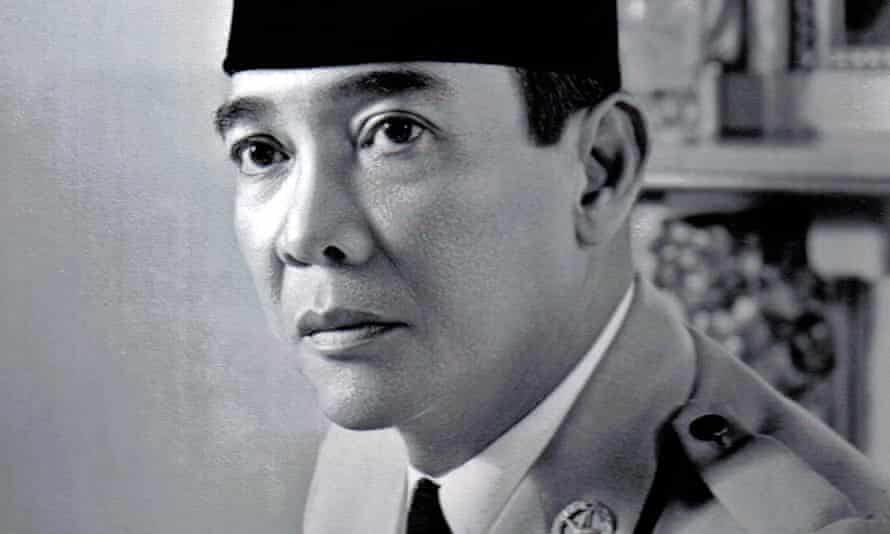UK’s propaganda leaflets inspired 1960s massacre of Indonesian communists
Pamphlets attacked the
president and foreign minister

Shocking new details have emerged of Britain’s role in one of the most brutal massacres of the postwar 20th century.
Last year the Observer revealed how British officials secretly deployed black propaganda in the 1960s to incite prominent Indonesians to “cut out” the “communist cancer”.
It is estimated that at least 500,000 people linked to the Indonesiacommunist party (PKI) were eliminated between 1965 and 1966.
Documents newly released in the National Archives show how propaganda specialists from the Foreign Office sent hundreds of inflammatory pamphlets to leading anti-communists in Indonesia, inciting them to kill the foreign minister Dr Subandrio and claiming that ethnic Chinese Indonesians deserved the violence meted out to them.
The British wanted the Indonesian army and militias to overthrow elected president Sukarno’s government. He and Subandrio were considered to be too close to the PKI and communist China, and Britain wanted to end Confrontation, the low-level military and political campaign launched by Sukarno and Subandrio against the Malaysian Federation.
The newly discovered pamphlets, dating from the mid-1960s, targeted the leftwing foreign minister, repeatedly challenging the anti-communists to kill Subandrio, describing him as Sukarno’s pet “cockerel”. The propagandists reserved special venom for Subandrio. “The Army has only pulled out a few of the cockerel’s many feathers, they haven’t even clipped its wings,” the pamphlets complained. The bird needed its “neck wrung; and the whole of Indonesia will rejoice”.
Hundreds of pamphlets were also sent to Muslim anti-communists, claiming agents of communist China would take over Indonesia. Following an abortive coup in which six generals were kidnapped and murdered, which the army blamed on the communists, “it was inevitable” that “many innocent Chinese would suffer in consequence”, one covert British pamphlet claimed. “We may deplore the unbridled fury” unleashed on Indonesia’s Chinese, but “we realise that for the most part they only have themselves to blame”.
The British also wrote the script for a ghoulish radio broadcast, purportedly from the dead generals whose bodies had been dumped in a well. “Worms may feed upon our rotting flesh,” cried the dead generals “but our voices have become the voices of the Nation’s conscience.” “Oh Subandrio!” they shrieked, “Do you not think that a hangman’s rope is too easy a way out for such a man as you?”
Immediately after the coup attempt, General Suharto took control of the Indonesian army and oversaw the massacres of the anti-communist purge. Over the next months, the rightwing, pro-west Suharto usurped the ailing Sukarno. He was appointed acting president in 1967 and then president the following year. His dictatorship lasted for 32 years.
Lenah Susianty, whose father was arrested and detained in the crackdown said: “The whole Chinese community in Sukabumi bore the brunt for a long time.” Susianty, who is now on the board of the Indonesian human rights organisation Tapol, added: “They were afraid to say anything and had to silently bear extortion, harassment and other ill-treatment from others in the society. They were an easy target because they were considered as ‘communists’.”

Soe Tjen Marching’s father was also tortured and imprisoned for two-and-a-half years because the military suspected him of being a member of the PKI. Now a lecturer at Soas University of London, she says that the targeting of the Chinese community in 1965 had “a huge part in sustaining suspicion as well as discrimination between Chinese and non-Chinese in Indonesia. It is therefore urgent for the British government to apologise”.
In October the Observer revealed the first hard evidence that British officials secretly deployed black propaganda in the 1960s. The material purported to come from exiled nationalist Indonesians. In fact it was written by Foreign Office psychological warfare experts working from a comfortable chalet in Singapore in cooperation with MI6. For five decades the Foreign Office has denied any involvement in the murders.
As the massacres started in October 1965, British pamphlets called for “the PKI and all communist organisations” to “be eliminated”. The nation, they warned, would be in danger “as long as the communist leaders are at large, and their rank and file are allowed to go unpunished”.
At least 500,000 people were massacred, and some estimates go as high as three million. These included ethnic Chinese, many who were killed by Muslim and other militias.
Steve Alston of Tapol yesterday said his organisation was “appalled that the British government engaged in a disinformation campaign to incite violence”.
“In the face of such evidence, the British government must now commit to launching an inquiry by independent counsel to be completed within 18 months.”
https://www.theguardian.com/world/2022/jan/23/uks-propaganda-leaflets-inspired-1960s-massacre-of-indonesian-communists




Geen opmerkingen:
Een reactie posten